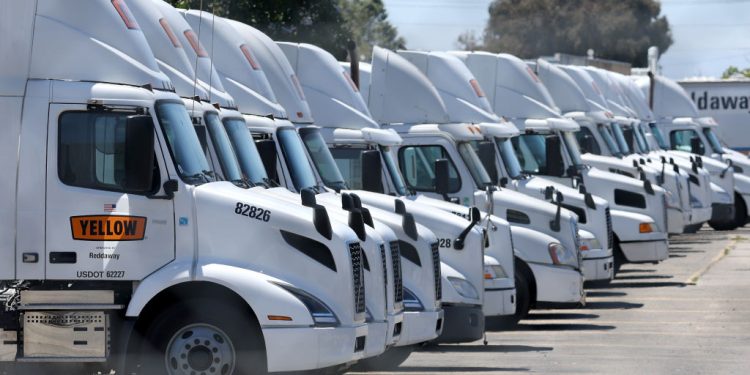Yellow Corp., whose trucks have been a fixture on American highways, is filing for bankruptcy and has ceased operations.
“Yellow has historically proven that it could not manage itself despite billions of dollars in worker concessions and hundreds of millions in bailout funding from the federal government,” Teamsters General President Sean M. O’Brien said in a statement, according to Reuters.
The 99-year-old trucking company will lay off all 30,000 employees, according to CNN. The Teamsters Union represents about 22,000 drivers and dock workers who are now out of work.
Yellow, which has a fleet of more than 12,000 trucks, notified customers and employees on Sunday that it would cease operations, prepare to file for bankruptcy and sell off parts of the company, according to the Wall Street Journal.
The Journal called Yellow’s demise the “biggest collapse in terms of revenue and jobs for the fickle U.S. trucking industry.”
“It’s an incredibly sad situation because there’s the potential that this company that was about to celebrate its 100-year anniversary next year may not be around,” said Chris Sultemeier, a Yellow board member since 2020.
On Friday, Teamsters officials told local unions that the “likelihood that Yellow will survive is increasingly bleak.”
The Friday memo urged union workers to take home any tools or personal belongings to ensure that when the company went bankrupt, those items were not locked away out of reach.
Since 2009, Yellow has earned about $5 billion a year in revenue, but at best only saw profits below $25 million, the Journal reported.
Satish Jindel, president of SJ Consulting, said Yellow was not competitive in either price or delivery times.
“They have not operated and managed well,” Jindel said. “You have to have proper service to get good rates.”
Yellow started in Oklahoma City in 1924 as a taxi and bus operation, but it grew through multiple acquisitions and even a 1951 bankruptcy.
Yellow received a $700 million loan as part of a federal COVID-19 rescue package but was still unable to make ends meet after the pandemic ended.
The company and the union had battled as Yellow’s fiscal health failed.
Mike Regan, an executive at TranzAct Technologies, blamed the union.
“The Teamsters clearly overplayed their hand,” he said.
President O’Brien disagreed.
“We do not want to see any company suffer and go out of business, but at some point in time, we cannot keep sacrificing wages, conditions that our forefathers and foresisters had fought long and hard for in our freight division,” he said during a July 22 rally in Atlanta.
This article appeared originally on The Western Journal.


























 Continue with Google
Continue with Google